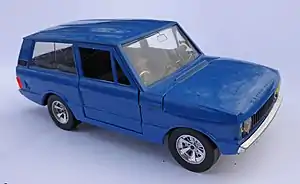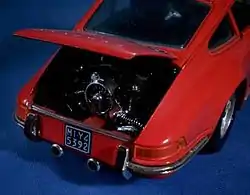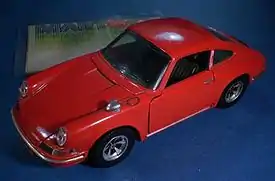Martoys
Martoys was a diecast toy car company founded close to Milan, Italy, in 1974. It specialized in a series of 1:24 scale metal cars with many opening.features After only two years, the brand name was changed to Bburago, thus Martoys models are rather rare today.

Between Mebetoys and Bburago
Martoys was founded by the Besana brothers, Ugo, Martino, and Mario, who sold their first well-known brand Mebetoys to Mattel (Gran Toros website). For this brand new line, only models in 1:24 scale were produced. In 1976, after only two years, the Besanas renamed the brand Bburago (with two 'B's at the beginning of the name). It is said that the change came because of possible confusion with the classic toy maker Marx Toys, where the 'X' in the logo was often not noticed, thus Marx sometimes being referred to as 'Mar Toys' (Gran Toros website; MarXToys website).
Models
According to the 1975 catalog, there were only nine basic models in the Martoys line-up, though most of these were offered in at least a couple of versions (Martoys 1975). These models were: Renault Alpine (and Alpine rally), Porsche 911 (S, Carrera RS, and "Polizei"), FIAT 127 (plain, "vigili urbani", and rally), Lancia Stratos (Marlboro or Alitalia), Range Rover (plain and airport fire), Renault 5, BMW 3.0 CS, Lancia Beta, and Audi 80GT (Martoys 1975; Sinclair's 1976).
In that catalog, the Audi, BMW, Lancia Beta, Renault 5 and Range Rover were portrayed with photographs of real vehicles, not the models, so there is some doubt about whether all the proposed line was produced as Martoys, or if some were as yet under development - to be later introduced after the name change to Bburago. A FIAT 131 (plain and Carabinieri) was also apparently produced, but it was not shown in the 1975 catalog. A newsletter/flyer from David Sinclair, perhaps the earliest importer of Martoys to the United States, reported all of the above were available except the Lancia Beta (listed as available later) and the FIAT 131 (not listed at all, see Sinclairs 1976; Levine 2009). The 131 appears to have been the last model to reach production under the Martoys label.
Detail and Rendering
Models were attractive and well-done but this was when larger scales were just becoming (along with Polistil) popular as toys for easier rending of details - yet before collector and consumer demand for near perfect rendition occurred through the 1990s (Sinclair's 1976). So, some of the Martoys line simply did not look right. The frames on the opening doors of the FIAT 127 were thick, unrefined and appeared toy-like. The BMW 3.0 CS simply could not capture the delicate fender curves of the real car and grille proportions were squarish. The subtle lines that defined the beauty of the real machine that Alexander Calder went on to decorate were lost on the Martoys model.

The Porsche 911 was very nicely done, both in engine, body, lights and script and logo detail. With a little bit of trim paint the model was stunning (Sinclair's 1976). Nevertheless, the Porsche's roof line and rear quarters do not appear perfectly captured.
Packaging
Martoys boxes had two different card-box designs. The older one featured accentuated rounded graphic letters popular in the 1970s. The lettering was overlapped and staggered on top of itself four times, starting with a dark purple blue in the background and fading to lighter and lighter green on top, the 'O' in Martoys formed a three-ring red bulls eye that looked like the Target store symbol. The design was colorful and not subtle - it was more toy-like than collector-like.
The boxes featured a picture of the model and not usually the real car (in contrast to fellow Italian manufacturer Polistil's S series which had actual photos of the real automobile). Later, all models had a white box with less flamboyant graphics. As with Polistil's S-series, box designs did not have the transparent plastic window to see the real model inside that became the standard for all larger scale toys later on. Printed on the bottom panel of the box were specifications of the real car, and if you were lucky the catalog came inside.
A Brand Forgotten

A couple of years after Mebetoys was sold to Mattel, the Besana brothers made plans to form the new company. Martoys, however, never had the chance to develop a firm image for itself. When the name was changed, none of the graphics or signage was kept. All was abandoned for the new Bburago look. Bburago's trek, even under an onslaught of larger scale toys and collectibles has lasted since 1976, though it was finally acquired by the Asian company Maisto in 2008. A perusal of the company history and vision on the official Bburago website says nothing about Martoys (Bburago website), though one could say Martoys was in many ways responsible for the big trend in larger scale diecast that was to become the rage in the 1980s and 1990s.
The Gran Toros website reports that Martino Besana died around 1993. As of 2008, Mario was suffering from cancer, but Ugo was in good health. Ugo (now in his 80s) and his wife had founded Vivien Company making toy irons and ironing boards - products similar to those made in the early days of Mebetoys (Gran Toros website).
References
Bburago Website. https://web.archive.org/web/20090823083623/http://www.bburago.com/index.php
Gran Toros Website. http://www.grantoros.com
Levine, R. F. 2009. David Sinclair in the Driver's Seat. Lake Erie LifeStyle, web published December 1.
Martoys. 1975. Leaflet brochure of Martoys Company.
MarXToys Website. http://www.martoys.com/history.html
Mebetoys Website. https://web.archive.org/web/20090727070518/http://www.mebetoys.com/
Sinclair's Auto Miniatures. 1976. Newsletter and sales packet. Erie, Pennsylvania.